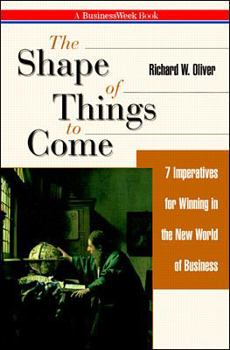The Shape of Things to Come: 7 Imperatives for Winning in the New World of Business
No Synopsis Available.
Format:Hardcover
Language:English
ISBN:0070482632
ISBN13:9780070482630
Release Date:August 1998
Publisher:McGraw-Hill Companies
Length:226 Pages
Weight:1.20 lbs.
Dimensions:1.0" x 6.3" x 9.3"
Customer Reviews
3 ratings
Highly Recommended!
Published by Thriftbooks.com User , 23 years ago
Author Richard W. Oliver argues that speed and customer responsiveness are keys to the new world of business. To stay alive, companies must flatten their corporate structures, do away with old roles, and embrace the technology that allows data mining and Internet-based purchasing. The author predicts that in the new century companies will sell directly to consumers, job descriptions will become more fluid, and smart cards and knowbots will become ubiquitous devices. This compelling, thoughtful book examines the trends shaping the global economy. While the book isn't always organized clearly, it illustrates its points through examples of real companies which have changed their practices. We [...] recommend this book to any owners, executives, and managers who are involved in planning long-term strategies.
And What Comes After the Information Age?
Published by Thriftbooks.com User , 26 years ago
Richard Oliver held executive positions at Nortel and DuPont. He is currently a professor of marketing at the Owen Graduate School of Management at Vanderbilt University and sits on the boards of six U.S. companies. Daniel Bell's THE POST INDUSTRIAL SOCIETY heralded the end of the industrial era and outlined the structure of the information age. THE SHAPE OF THINGS TO COME heralds the end of the information age and outlines the structure of what Oliver calls the Bio-Materials Age.Can it really be that the information age is just about to end? Oliver makes a convincing argument that it is already over.The author structures the outlines of what needs to be done in the Bio-Materials Age and provides concrete examples of companies currently doing it: Southwestern Airlines, Oticon, W. I Gore & Associates, Chaparral Steel, Granite Rock Company, Bank of Montreal, and the U.S. Military. We love the range of the companies he selected!As we on Boards of Directors help steer our companies out of the industrial era into the information age, it is vital to keep in mind that the information age itself will be a relatively short transition. "Keep Your Eyes on the Ball" is necessary but insufficient. We need to make sure that management is keeping its eyes on the direction of the ball.You don't have to agree with every detail in his book. But you will probably acknowledge that the general direction of Richard Oliver's argument is both logical and unavoidable.MARYANNE PEABODY & LAURENCE J. STYBEL are co-founders of Boston-based STYBEL PEABODY ASSOCIATES.
Food for thought for global strategists.
Published by Thriftbooks.com User , 26 years ago
I put this book in my briefcase for reading on a recent overseas flight. I found it to be very interesting, especially where Professor Oliver describes how successful companies must operate in the 21st century. I am a strong advocate of quality customer service. I like his concept that huge national markets may disappear and be replaced by billions of individual customers whose needs must be fulfilled for a company to be successful. John R. Jagoe, Director, Export Institute.






